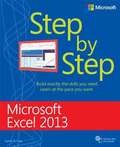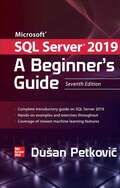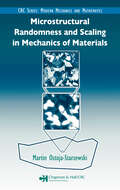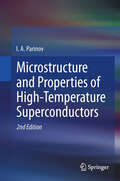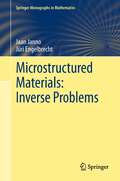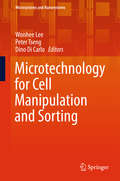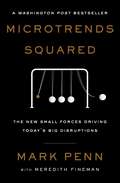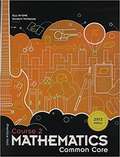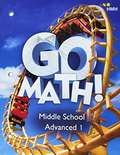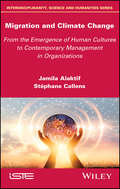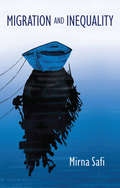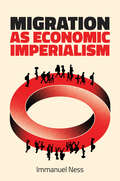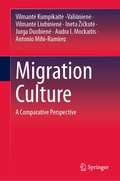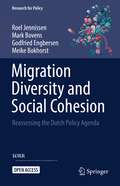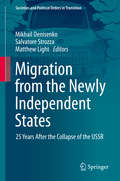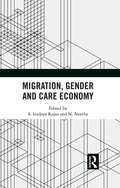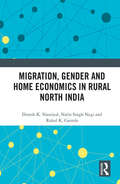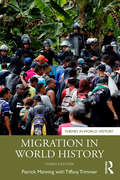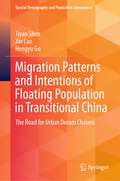- Table View
- List View
Microsoft Excel 2013: Step by Step
by Curtis D. Frye<p>Experience learning made easy—and quickly teach yourself how to manage, analyze, and present data with Excel 2013. With Step by Step, you set the pace—building and practicing the skills you need, just when you them! Includes downloadable practice files and companion eBook.</p>
Microsoft Sql Server 2019: A Beginner's Guide, Seventh Edition
by Dusan PetkovicGet Up to Speed on Microsoft® SQL Server® 2019 Quickly and Easily Start working with Microsoft SQL Server 2019 in no time with help from this thoroughly revised, practical resource. Filled with real-world examples and hands-on exercises, Microsoft SQL Server 2019: A Beginner’s Guide, Seventh Edition starts by explaining fundamental relational database system concepts. From there, you’ll learn how to write Transact-SQL statements, execute simple and complex database queries, handle system administration and security, and use powerful analysis and reporting tools. New topics such as SQL and JSON support, graph databases, and support for machine learning with R and Python are also covered in this step-by-step tutorial. • Install, configure, and customize Microsoft SQL Server 2019 • Create and modify database objects with Transact-SQL statements • Write stored procedures and user-defined functions • Handle backup and recovery, and automate administrative tasks • Tune your database system for optimal availability and reliability • Secure your system using authentication, encryption, and authorization • Work with SQL Server Analysis Services, Reporting Services, and other BI tools • Gain knowledge of relational storage, presentation, and retrieval of data stored in the JSON format • Manage graphs using SQL Server Graph Databases • Learn about machine learning support for R and Python
Microsoft Visual J# .NET
by Andy Longshaw John Sharp Peter Roxburgh<div xmlns="http://www.w3.org/1999/xhtml"><p>Presented in an easy-to-browse format, this erudite book provides the authoritative technical details you need to leverage Microsoft Visual J# .NET and the richness of the Microsoft .NET Framework to build scalable, enterprise-level applications.</p></div>
Microstructural Randomness and Scaling in Mechanics of Materials (Modern Mechanics and Mathematics)
by Martin Ostoja-StarzewskiAn area at the intersection of solid mechanics, materials science, and stochastic mathematics, mechanics of materials often necessitates a stochastic approach to grasp the effects of spatial randomness. Using this approach, Microstructural Randomness and Scaling in Mechanics of Materials explores numerous stochastic models and methods used in the m
Microstructure and Properties of High-Temperature Superconductors
by I. A. ParinovThe main features of high-temperature superconductors (HTSC) that define their properties are intrinsic brittleness of oxide cuprates, the layered anisotropic structure and the supershort coherence length. Taking into account these features, this treatise presents research into HTSC microstructure and properties, and also explores the possibilities of optimization of the preparation techniques and superconducting compositions. The "composition-technique-experiment-theory-model," employed here, assumes considerable HTSC defectiveness and structure heterogeneity and helps to draw a comprehensive picture of modern representations of the microstructure, strength and the related structure-sensitive properties of the materials considered. Special attention is devoted to the Bi-Sr-Ca-Cu-O and Y-Ba-Cu-O families, which currently offer the most promising applications. Including a great number of illustrations and references, this monograph addresses students, post-graduate students and specialists, taking part in the development, preparation and research of new materials. The new edition had been updated intensively, especially experimental investigations and modeling conductive and elastic properties of HTC superconductors have been added.
Microstructured Materials: Inverse Problems
by Jüri Engelbrecht Jaan JannoComplex, microstructured materials are widely used in industry and technology and include alloys, ceramics and composites. Focusing on non-destructive evaluation (NDE), this book explores in detail the mathematical modeling and inverse problems encountered when using ultrasound to investigate heterogeneous microstructured materials. The outstanding features of the text are firstly, a clear description of both linear and nonlinear mathematical models derived for modelling the propagation of ultrasonic deformation waves, and secondly, the provision of solutions to the corresponding inverse problems that determine the physical parameters of the models. The data are related to nonlinearities at both a macro- and micro- level, as well as to dispersion. The authors' goal has been to construct algorithms that allow us to determine the parameters within which we are required to characterize microstructure. To achieve this, the authors not only use conventional harmonic waves, but also propose a novel methodology based on using solitary waves in NDE. The book analyzes the uniqueness and stability of the solutions, in addition to providing numerical examples.
Microtechnology for Cell Manipulation and Sorting
by Wonhee Lee Peter Tseng Dino Di CarloThis book delves into the recent developments in the microscale and microfluidic technologies that allow manipulation at the single and cell aggregate level. Expert authors review the dominant mechanisms that manipulate and sort biological structures, making this a state-of-the-art overview of conventional cell sorting techniques, the principles of microfluidics, and of microfluidic devices. All chapters highlight the benefits and drawbacks of each technique they discuss, which include magnetic, electrical, optical, acoustic, gravity/sedimentation, inertial, deformability, and aqueous two-phase systems as the dominant mechanisms utilized by microfluidic devices to handle biological samples. Each chapter explains the physics of the mechanism at work, and reviews common geometries and devices to help readers decide the type of style of device required for various applications. This book is appropriate for graduate-level biomedical engineering and analytical chemistry students, as well as engineers and scientists working in the biotechnology industry.
Microtrends Squared: The New Small Forces Driving the Big Disruptions Today
by Meredith Fineman Mark PennTen years after his bestseller Microtrends, Mark Penn identifies the next wave of trends reshaping the future of business, politics, and culture.Mark Penn has boldly argued that the future is not shaped by society’s broad forces but by quiet changes within narrow slices of the population. Ten years ago, he showed how the behavior of one small group can exert an outsized influence over the whole of America. His bestselling Microtrends highlighted dozens of tiny, counterintuitive trends that have since come to fruition, from the explosion of internet dating to the recent split within the Republican Party. Today, the world is in perplexing upheaval, and microtrends are more influential than ever. In this environment, Penn offers a necessary perspective. Microtrends Squared makes sense of what is happening in the world today. Through fifty new microtrends, Penn illuminates the shifts that are coming in the next decade. He pinpoints the unseen hand behind new power relationships that have emerged—as fringe voters and reactionary politics have found their revival, as online influencers overshadow traditional media, and as the gig economy continues to invade new swathes of industry. He speaks to the next wave of developments coming in technology, social movements, and even dating. Offering a clear vision of the future of business, politics, and culture, Microtrends Squared is a must-read for innovators and entrepreneurs, political and business leaders, and for every curious reader looking to understand the wave of the future when it is just a ripple.
Middle Grades Math Course 2 Workbook
by Prentice-Hall StaffCourse 2 consists of a structured approach to a variety of topics such as ratios, percents, equations, inequalities, geometry, graphing and probability. <P><P> Test Taking Strategies provide a guide to problem solving approaches that are necessary for success on standardized tests. Checkpoint Quizzes assess student understanding after every few lessons. Daily Guided Problem Solving in the text is supported by the Guided Problem Solving worksheet expanding the problem, guiding the student through the problem solving process and providing extra practice.
Middle Grades Math Thematics (Book Two)
by Rick Billstein Jim Williamson Perry Montoya Jacqueline Lowery Dianne WilliamsThis course will help you learn all the important middle grades mathematics concepts and skills that prepare you for high school and beyond. Develop the reasoning, problem solving, and communication skills that enable you to apply mathematics to real-life activities. Value mathematics and become confident in using it to make decisions in daily life.
Middle School Advanced 1: STA Student Interactive Worktext 2018 (Go Math!)
by Edward B. Burger Juli K. Dixon Timothy D. KanoldNIMAC-sourced textbook
Middle School Math Solution (Course 1 #1)
by Sandy Bartle Finocchi Amy Jones Lewis Kelly Edenfield Josh FisherMiddle School Math Solution, Course 2
by Sandy Bartle Finocchi Amy Jones Lewis Kelly Edenfield Josh FisherNIMAC-sourced textbook
Migration
by Michael SamersIn the context of global security concerns, humanitarian crises and skill shortages migration and immigration have become central to economic, political and social debates at the beginning of the twenty-first century. And while migration and immigration have certainly not escaped the attention of social scientists, the study of both remains the most ‘under-serviced’ academic domain with respect to introductory texts. It is not surprising then that even fewer books have explored the contours of these social phenomena from an explicitly geographical perspective – in other words, in terms of ‘space’, ‘place’ and ‘scale’. Migration is an advanced, yet accessible, introduction to migration and immigration in a global context. It offers a critical, multi-disciplinary approach to the subject, borrowing from human geography, political science, social anthropology and sociology. However, unlike other broad volumes on the subject, it emphasizes a theoretical and conceptual approach to the study of migration. Specifically, Migration adopts a unique geographical approach by employing spatial concepts such as place, scale and territory. Using these spatial concepts, the author argues that most studies of migration begin with either an undue emphasis on nation-states as a lens on migration or on the contrary rely on exaggerated notions of transnationalism. Migration neither neglects the importance of nation states nor the significance of transnationalism, but it focuses on how local contexts matter to migration. The book covers such topics as migration categories, the explanation of different forms of migration, migration and employment, the geopolitics of migration and immigration and citizenship, rights, and belonging. This text is not simply an encyclopaedic overview of migration theories, trends and facts; rather, it is designed to have lasting intellectual value by providing particular arguments in each theme-based chapter. While it advocates certain arguments, it is also clearly written in an engaging and accessible manner for an undergraduate audience. Its clear structure is complemented by a combination of pedagogical features, such as case-study boxes, summary questions at the end of each chapter and a glossary. The book is designed for courses and modules on migration and immigration at the undergraduate and postgraduate levels and both students and academics will find it exceptionally useful.
Migration (Key Ideas in Geography)
by Michael Samers Michael CollyerWhile the subject of migration has received enormous attention in academic journals and books across the social sciences, introductory texts on the matter are few and far between. Even fewer books have explored migration through a critical and explicit engagement with spatial concepts. Now in its second edition, Migration remains the only text in more than a decade that emphasizes how geographical or spatial concepts can be used critically to understand migration. The multi-disciplinary text draws on insights from human geography, political science, social anthropology, sociology, and to a lesser extent economics. All of the chapters focus on key terms, theories, concepts, and issues concerning migration and immigration. The book argues that in the context of migration, two opposing ‘spatial positions’ have emerged in the wake of the critique of ‘methodological nationalism’. On one hand is the significance of ‘transnationalism’, and on the other, the importance of ‘sub-national’ or local processes. Both require more nuance and integration, while many of the concepts and theories which have thus far neglected space or have not been ‘treated’ spatially, need to be re-written with space in mind. Pedagogically the text combines a carefully defined structure, accessible language, boxes that explore case studies of migrant-related experiences in particular places, annotated suggestions for further reading, useful websites and relevant films and summary questions for student learning at the end of each chapter. Migration provides a critical, multi-disciplinary, advanced, and theoretically informed introduction to migration and immigration. Revised and updated with new material, new maps and illustrations and an accompanying website (https://migration2ndedition.wordpress.com/), it continues to be aimed at advanced undergraduates and Masters-level graduate students undertaking courses on migration and immigration.
Migration and Climate Change: From the Emergence of Human Cultures to Contemporary Management in Organizations
by Jamila Alaktif Stéphane CallensThis work aims to gain a long term better understanding on how human cultures are interacting with climate change. It is an analysis of the past and present of religions and deals particularly with spiritual and cultural relations regarding environment and climate. The literature on dating processes for the emergence of human myths and ritual practices distinguishes among myths and tales those that accompanied the development of productive economy and those that are related to periods when the climate was very unstable. Thus, we are experiencing nowadays the conflict between short-term political and religious views and shared global objectives which are expressed in relation to a climate history.
Migration and Inequality
by Mirna SafiIn a world of increasingly heated political debates on migration, relentlessly caught up in questions of security, humanitarian crisis, and cultural “problems,” this book radically shifts the focus to address migration through the lens of inequality. Taking an innovative approach, Mirna Safi offers a fresh perspective on how migration is embedded in the elementary mechanisms that shape the landscape of inequality. She sketches out three distinct channels which lead to unequal outcomes for different migrating and non-migrating groups: the global division of labor; the production of legal and administrative categories; and the reconfiguration of symbolic ethnoracial groups. Respectively, these channels categorize migrants as “type of workers,” “type of citizens,” and “type of humans.” Examining this intersection across the U.S. and Europe, she shows how studying international migration together with inequality can challenge nationally established paradigms of social justice. This timely book will be essential reading for all students and researchers interested in the sociology and politics of migration, ethnic and racial studies, and social inequality and stratification.
Migration as Economic Imperialism: How International Labour Mobility Undermines Economic Development in Poor Countries
by Immanuel NessFor several decades, wealthy states, international development agencies and multinational corporations have encouraged labour migration from the Global South to the Global North. As well as providing essential workers to support the transformation of advanced economies, the remittances that migrants send home have been touted as the most promising means of national development for poor and undeveloped countries. As Immanuel Ness argues in this sharp corrective to conventional wisdom, temporary labour migration represents the most recent form of economic imperialism and global domination. A closer look at the economic and social evidence demonstrates that remittances deepen economic exploitation, unravel societal stability and significantly expand economic inequality between poor and rich societies. The book exposes the damaging political, economic and social effects of migration on origin countries in Africa, Asia and Latin America, and how border and security mechanisms control and marginalize low-wage migrant workers, especially women and youth. Ness asserts that remittances do not bring growth to poor countries but extend national dependence on the export of migrant workers, leading to warped and unequal development on the global periphery. This expert take will be a valuable resource for students and scholars of migration and development across the social sciences.
Migration Culture: A Comparative Perspective
by Vilmantė Kumpikaitė -Valiūnienė Vilmantė Liubinienė Ineta Žičkutė Jurga Duobienė Audra I. Mockaitis Antonio Mihi-RamirezThis book examines the emergence of a culture of migration through outward migration as a country-specific phenomenon and analyzes it from different perspectives, covering various aspects such as the history of a country, its migration flows, migration push factors, social, economic, and political issues, as well as individual values. In the first part, the authors present a theoretical background on migration culture formation. This is followed by an in-depth analysis of migration culture in Lithuania in the second part. The presented case study is based on a quantitative survey study of almost 5.400 respondents. Further, the results of this case study are compared and adapted to other classical migration countries in the European Union, such as Spain or Portugal.The book, therefore, is a must-read for everybody interested in a better understanding of migration and the emergence of a culture of migration in different countries.
Migration Diversity and Social Cohesion: Reassessing the Dutch Policy Agenda (Research for Policy)
by Roel Jennissen Mark Bovens Godfried Engbersen Meike BokhorstThis open access book shows policymakers which initiatives work when responding to the increasing diversity in cities, towns and neighborhood's. In recent times, policymakers have grappled with ways of responding to this increase, which has resulted in a plethora of policy initiatives, some more effective than others. Bringing together a large amount of research and evidence-based policy recommendations, this book offers both a sense of strategic direction as well as more specific, actionable advice. It brings together a remarkable mixture of policy areas that touch upon issues of diversity, immigration policy, education, and labour policy. It is of benefit and importance to all those making policies for a country with increasing immigration.
Migration from the Newly Independent States: 25 Years After the Collapse of the USSR (Societies and Political Orders in Transition)
by Matthew Light Mikhail Denisenko Salvatore StrozzaThis book discusses international migration in the newly independent states after the collapse of the Soviet Union, which involved millions of people. Written by authors from 15 countries, it summarizes the population movement over the post-Soviet territories, both within the newly independent states and in other countries over the past 25 years. It focuses on the volume of migration flows, the number and socio-demographic characteristics of migrants, migration factors and the situation of migrants in receiving countries. The authors, who include demographers, economists, geographers, anthropologists, sociologists and political scientists, used various methods and sources of information, such as censuses, administrative statistics, the results of mass sample surveys and in-depth interviews. This heterogeneity highlights the multifaceted nature of the topic of migration movements.
Migration, Gender and Care Economy
by S. Irudaya Rajan N. NeethaThis volume closely analyses women’s role and experiences in migration (internal and international) and its interlinkages with the care economy in their functions as nurses and paid domestic workers as well as unpaid carers. Bringing together case studies from across India and other parts of the world, the essays in the volume capture the characteristics and specificities of female migration in different settings — be it for economic or associational reasons, or as left behind members. The book also looks at gender-specific discriminations and vulnerabilities along with the empowering aspects of migration. This volume will be of great interest to scholars and researchers of migration, gender studies, sociology, and social anthropology, as well as development studies, demography, and economics.
Migration, Gender and Home Economics in Rural North India
by Dinesh K. Nauriyal Nalin Singh Negi Rahul K. GairolaThis book critically examines the socio-economic impacts of out-migration on households and gender dynamics in rural northern India. The first of its kind, this study unearths, through detailed regional and demographical research, the ways in which economic and migratory trends of male family members in rural India in general, and hilly regions of Garhwal in particular, affect the wives, children, extended families, and agricultural lands that they have left behind. It offers vital research in how rural India’s socio-economic formations and topographic characteristics can today more effectively contribute to the national and global economy with respect to migratory trends, gender dynamics and home life. Furthermore, it investigates the collapse of agricultural and many other traditional economic activities without a corresponding creation of fresh economic opportunities. This book moreover elucidates how male out-migration from rural to urban centres has greatly re-shaped kinship and economic structures at places of origin and has consequently had a serious impact on the socio-psychological well-being of family members. This book will be of great value to scholars and researchers of development economics, agricultural economics, environment studies, sociology, social anthropology, population studies, gender and women’s studies, social psychology, migration and diaspora studies, South Asian studies and behavioral studies.
Migration in World History (Themes in World History)
by Patrick Manning Tiffany TrimmerIn this third edition of Migration in World History, Patrick Manning presents an expanded and newly coherent view of migratory processes, conveying new research and interpretation. The engaging narrative shows the continuity of migratory processes from the time of foragers who settled the earth to farmers opening new fields and merchants linking purchasers everywhere. In the last thousand years, accumulation of wealth brought capitalism, industry, and the travels of free and slave migrants. In a contest of civilizational hierarchy and movements of emancipation, nations arose to replace empires, although conflicts within nations expelled refugees. The future of migration is now a serious concern. The new edition includes: An introduction to the migration theories that explain the shifting patterns of migration in early and recent times Quantification of changes in migration, including international migration, domestic urbanization, and growing refugee movements A new chapter tracing twenty-first-century migration and population from 2000 to 2050, showing how migrants escaping climate change will steadily outnumber refugees from other social conflicts While migration is often stressful, it contributes to diversity, exchanges, new perspectives, and innovations. This comprehensive and up-to-date view of migration will stimulate readers with interests in many fields.
Migration Patterns and Intentions of Floating Population in Transitional China: The Road for Urban Dream Chasers (Spatial Demography and Population Governance)
by Tiyan Shen Xin Lao Hengyu GuThis book investigates domestic migration and migration intentions in China from the individual, city, and provincial levels. Since the 1990s, accompanying the rapid urbanization, an important feature of China’s social transition is its large-scale interregional migration, which has reshaped China’s economic geography and population distribution and greatly affected the socio-economic development. The floating population, migrants working and living in the destination cities without local hukou, have aroused wide public concern in the past decades. Based on China’s national population census data and China Migrants Dynamic Survey data, this book comprehensively employs statistical analysis, spatial analysis, network analysis, econometric and spatial econometric methods to analyze the spatial pattern and influencing mechanism of internal migration and migration intentions of floating population from different levels and different perspectives. The research results of this book have significant policy implications for the urban governance on the floating population. The novelty of this book is that it comprehensively investigates domestic migration and migration intentions from the individual, city and provincial levels, combining their spatial patterns and network structures. It not only provides a wealth of case studies for domestic migration research in China, but also broadens the research scope of spatial demography by employing new methods of spatial econometrics (such as MGWR and ESF). This book is suitable for undergraduates and graduates majoring in Human Geography, Regional Economics, Urban Planning and Urban Governance, as well as related researchers and practitioners.
